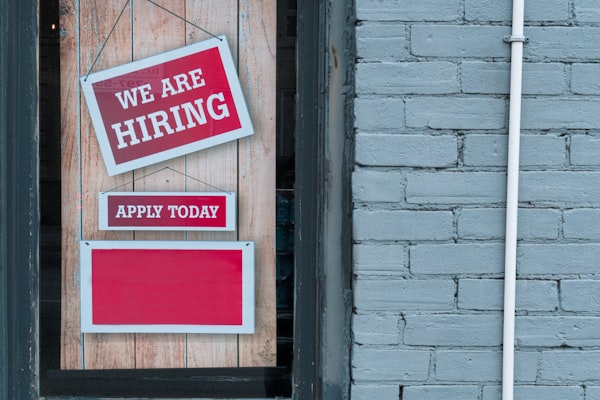Which Jobs Will Survive AI?

The advent of artificial intelligence (AI) has sparked widespread speculation about the future of work. While some jobs may be susceptible to automation, others are expected to remain relatively secure in the face of AI advancements. This report synthesizes information from various sources to identify the jobs that are likely to survive the rise of AI.
Healthcare and Education
Healthcare jobs, particularly those requiring empathy and complex decision-making, are less likely to be fully automated. This includes roles such as nurse practitioners, physician assistants, mental health counselors, and other specialized healthcare providers. The projected growth rates for these professions by 2032 are significant, indicating a low risk of automation.
Education is another sector where human interaction is crucial. Teaching and mentoring roles require a deep connection with students and the ability to adapt to individual needs, which AI cannot easily replicate.

The Impact of Generative AI on Healthcare and Education Jobs
The advent of generative artificial intelligence (AI) is reshaping the landscape of various industries, with healthcare and education being at the forefront of this transformation. The integration of AI into these sectors is not only enhancing operational efficiencies but also altering the job roles and responsibilities of professionals. Here's an in-depth look at how generative AI is impacting jobs in healthcare and education.
Healthcare: A New Era of Efficiency and Accessibility
In healthcare, AI is being utilized for a multitude of tasks, ranging from patient communication to assisting in surgeries and the development of new pharmaceuticals[1]. Generative AI, in particular, is gaining traction for its ability to improve healthcare access and affordability. A survey by Deloitte's Center for Health Solutions revealed that 53% of U.S. consumers believe generative AI could improve access issues and shorten wait times for medical care, while 46% see its potential to make healthcare more affordable[2].
Generative AI is also being used to understand treatment options and decipher technical language, with 71% of consumers currently using generative AI believing it could revolutionize healthcare delivery[2]. This optimism is reflected in the substantial investments flowing into generative AI startups, indicating the industry’s recognition of its transformative potential[5].
However, the integration of AI in healthcare is not without its challenges. There is a growing concern about the potential for AI to make mistakes, and the need for human judgment and experience remains paramount[2]. AI is not expected to replace doctors but rather to augment their capabilities, providing real-time guidance and recommendations based on patient data to inform decisions and reduce the risk of errors[3].
Education: Enhancing Learning and Teaching
In the realm of education, AI is revolutionizing the way learning and teaching are conducted. AI-powered virtual patients for hands-on training and AI-generated exam questions for objective assessment are just a few examples of how AI is being applied[3]. The technology is poised to improve the quality of scientific publications by streamlining the peer-review process and supporting reproducibility[3].
AI's role in education extends to the publishing of scientific articles, where it can help manage the increasing volume of submissions and enhance the peer-review process. The use of AI in writing scientific articles is also emerging as a new form of publication, showcasing the technological power of AI in the field of writing[3].
Job Implications and Future Prospects
The impact of generative AI on job roles in healthcare and education is significant. In healthcare, it may lead to workforce cuts in certain areas and necessitate substantial reskilling efforts to adapt to evolving talent needs[5]. For educators and medical professionals, AI presents opportunities for continuous learning and staying updated with best practices[3].
The future of AI in these sectors is likely to see more personalized and efficient services, with AI taking on repetitive and labor-intensive tasks. This will free up professionals to focus on more complex and nuanced aspects of their jobs, ultimately leading to better patient and student outcomes.
In conclusion, while generative AI is set to improve accessibility, affordability, and efficiency in healthcare and education, it also requires careful consideration of its ethical use and the continued importance of human expertise. The technology is not a replacement for professionals but a tool that, when used responsibly, can greatly enhance their work and the services they provide.
Citations:
[1] https://www.ibm.com/blog/the-benefits-of-ai-in-healthcare/
[2] https://www.fiercehealthcare.com/ai-and-machine-learning/us-patients-believe-generative-ai-can-improve-access-affordability
[3] https://www.ncbi.nlm.nih.gov/pmc/articles/PMC10219811/
[4] https://www.a3logics.com/blog/generative-ai-in-healthcare
[5] https://www.veritis.com/blog/overcoming-challenges-implementing-generative-ai-in-healthcare/
Creative and Leadership Roles
Creative industries rely on human creativity, emotional intelligence, and unique perspectives, making them less susceptible to AI disruption. This includes jobs such as artists, designers, choreographers, and entertainers.
Leadership positions are also unlikely to be automated due to the need for emotional intelligence, intuitive decision-making, and the ability to develop relationships. This extends to roles in public relations and digital marketing, where creativity and empathy are essential.
The Impact of Generative AI on Creative and Leadership Roles
The integration of generative artificial intelligence (AI) into the workforce is transforming creative and leadership roles in profound ways. While concerns about AI replacing human jobs persist, the reality is more nuanced, with AI acting as a tool that enhances creativity, productivity, and decision-making. Here's how generative AI is reshaping jobs in creative industries and leadership positions.
Creative Roles: Augmentation Over Replacement
In creative sectors such as arts, design, entertainment, sports, and media, generative AI is seen not as a threat but as a valuable tool that can augment human creativity. Goldman Sachs predicts that 26% of current work tasks in these sectors could be automated by AI in Europe and the US[1]. However, this automation is more about assisting creative professionals than replacing them. Generative AI, through platforms like DALL-E 2 and Midjourney, enables the creation of text, image, and video content based on prompts, which are derived from vast amounts of data fed by humans[1]. This technology can help with tasks such as chatbots, A/B testing, voice recognition, and data analysis, freeing up creative minds to focus on innovation and originality[1].
Despite AI's capabilities, it cannot replace the unique insights, experiences, and emotional intelligence that human creators bring to their work. For instance, while AI can generate a painting or a song, it requires a human artist to imbue the work with style and meaning[2]. Moreover, AI-generated content still lacks the personal touch and originality that come from human experience, underscoring the irreplaceable value of human creativity[1].
Leadership Roles: Enhancing Decision-Making and Efficiency
In leadership roles, AI's impact is centered around enhancing decision-making processes, strategic planning, and personal development. According to an experiment by MDI CEO Gunther Fürstberger, AI can support the four main roles of a leader as defined by Covey: creating trust, developing visions, implementing strategies, and coaching potentials[5]. AI can provide data-driven insights, automate repetitive tasks, and offer learning suggestions, thereby augmenting a leader's ability to make informed decisions and strategize effectively[5].
However, human leaders possess qualities that AI cannot replicate, such as emotional intelligence, empathy, creativity, and the ability to inspire and motivate others[5]. These human attributes are crucial for building trust, developing compelling visions, navigating resistance, and fostering personal development among team members[5].
The Future of Work: Collaboration Between Humans and AI
The future of creative and leadership roles in the AI era is not about replacement but collaboration. Generative AI offers tools that can enhance human capabilities, automate mundane tasks, and provide new insights, allowing professionals to focus on higher-value activities that require human intuition, creativity, and emotional intelligence[3][4]. As AI continues to evolve, it is essential for professionals to adapt by learning how to leverage these technologies to augment their work, rather than viewing them as a threat to job security[4].
In conclusion, generative AI is transforming creative and leadership roles by providing powerful tools for augmentation and efficiency. While AI can automate certain tasks and offer new insights, the unique qualities of human creativity, emotional intelligence, and leadership cannot be replicated by machines. The future of work in these fields will likely be characterized by a synergistic relationship between humans and AI, where each complements the other's strengths[1][2][3][4][5].
Citations:
[1] https://the-media-leader.com/how-ai-may-impact-creative-roles/
[2] https://www.linkedin.com/pulse/impact-ai-creative-roles-what-you-need-know-andy-cairns
[3] https://www.forbes.com/sites/worldeconomicforum/2023/09/19/generative-ai-can-impact-jobs-by-enhancing-creativity-and-productivity/?sh=58dfb8604a1f
[4] https://www.roberthalf.com/us/en/insights/research/artificial-intelligence-jobs-could-open-doors-to-new-creative-careers
[5] https://www.mdi-training.com/blog/blog/exploring-the-influence-of-ai-on-leadership-roles-an-experiment-by-a-ceo/
Legal and Ethical Professions
Lawyers and legal consultants are expected to continue their work alongside AI, as machines are unlikely to replace the nuanced and complex nature of legal work in the near future. Additionally, new roles such as AI ethicists and bias mitigators are emerging to address the ethical considerations of AI technology.
The Impact of Generative AI on Legal and Ethical Professions
The legal and ethical professions are undergoing a significant transformation due to the advent of generative artificial intelligence (AI). This technology, which includes large language models (LLMs) like GPT-4, is reshaping how legal work is conducted, from automating mundane tasks to generating novel solutions. However, this integration also brings forth a myriad of ethical considerations and challenges that professionals must navigate. Here's an exploration of how generative AI is impacting jobs in the legal and ethical professions, highlighting both the opportunities and the challenges.
Opportunities for Legal Professionals
Generative AI is perceived as a catalyst for growth within the legal industry. According to a survey conducted by Thomson Reuters, legal professionals across various sectors see AI as capable of enabling growth opportunities[1]. For law firms, AI reduces friction in launching new services or expanding into new markets by freeing up time for professionals to identify and evaluate attractive markets for expansion[1]. In corporate departments, AI gives legal professionals more time to support their organizations’ strategy and growth objectives[1].
Furthermore, AI and LLMs promise to enhance the performance of legal software tools, assisting litigators in navigating the substantial degree of risk associated with using these technologies[2]. Generative AI can enhance legal work without compromising ethics, provided that attorneys understand the technology and its limitations[2].
Ethical and Legal Challenges
Despite the potential benefits, the use of generative AI in legal work comes with significant ethical and legal challenges. One of the primary concerns is the risk of inaccuracies and the potential for AI to "hallucinate" or generate plausible but factually incorrect information[4]. This raises concerns about the quality of legal advice and the potential for malpractice[2][4].
Protecting client confidentiality is another significant ethical concern. Generative AI, by its nature, learns at least in part based on information that users provide, posing risks to data security and client privacy[2]. Legal professionals must navigate these challenges responsibly, ensuring that they do not compromise their duty to provide competent representation[3].
Navigating the Future
To navigate the future effectively, legal professionals are encouraged to embrace lifelong learning and upskilling, developing a combination of technical, cognitive, and social skills that will enable them to work effectively with AI[1]. They must also define the role and scope of AI in their work, identifying which tasks could or should be automated with, augmented by, or delegated to machines and which ones require human oversight, judgment, and creativity[1].
Moreover, legal professionals must consider the ethical, legal, and social implications of AI and adhere to the principles of responsible and ethical AI, such as fairness, accountability, transparency, and privacy[1]. This includes being technologically competent, familiar with how AI platforms are trained, their limitations, and for which tasks they can be used[2].
Conclusion
The integration of generative AI into the legal and ethical professions offers both opportunities and challenges. While AI can enhance efficiency, accuracy, and cost-effectiveness in legal work, it also raises significant ethical and legal concerns that professionals must address. By adopting a strategic approach to the future of work, embracing lifelong learning, and adhering to ethical principles, legal professionals can leverage AI to transform their work and navigate the challenges ahead with confidence and optimism[1][2][3][4][5].
Citations:
[1] https://hbr.org/sponsored/2023/12/a-new-survey-reveals-how-legal-professionals-expect-ai-to-impact-their-work
[2] https://legal.thomsonreuters.com/blog/the-key-legal-issues-with-gen-ai/
[3] https://josephhollander.com/news-blog/the-year-technology-ate-the-legal-profession/
[4] https://legal.thomsonreuters.com/blog/will-ai-take-over-lawyer-jobs-3-reasons-to-object/
[5] https://www.forbes.com/sites/worldeconomicforum/2023/09/19/generative-ai-can-impact-jobs-by-enhancing-creativity-and-productivity/?sh=58dfb8604a1f
Skilled Trades and Human-Centered Work
Skilled tradespeople, artisans, and craftsmen rely on mobility, dexterity, and flexibility in unpredictable environments, which are challenging for AI to replicate. Human-centered work, such as building sophisticated relationships with people, is also less likely to be automated.
The Impact of Generative AI on Skilled Trades and Human-Centered Work
The integration of generative artificial intelligence (AI) into the workforce is heralding a new era for skilled trades and human-centered professions. While the narrative around AI often centers on the potential for job displacement, the reality is more complex and nuanced. Generative AI, with its ability to automate tasks, enhance productivity, and foster creativity, is not just reshaping the job landscape but also revitalizing the importance of human touch and expertise in skilled trades[1]. Here's an exploration of how generative AI is impacting jobs in these sectors, highlighting both the opportunities and challenges.
Opportunities in Skilled Trades
Skilled trades, encompassing a wide range of professions from electricians to carpenters, are experiencing a renaissance thanks to generative AI. The technology's ability to automate routine tasks allows tradespeople to focus more on the intricate, hands-on aspects of their work that require a human touch[1]. For instance, AI can handle the scheduling, inventory management, and even some aspects of design work, freeing up skilled workers to concentrate on the craftsmanship that defines their trade[1].
Moreover, generative AI is enhancing the creativity and productivity of skilled trades by providing tools that can simulate complex designs, predict material needs, and even suggest improvements to workflows[2]. This not only boosts efficiency but also opens up new avenues for innovation within these professions.
Human-Centered Work: A Focus on Personal Interaction
Human-centered professions, such as education, healthcare, and social services, stand to benefit significantly from the adoption of generative AI. These sectors, characterized by a high degree of personal interaction, are less likely to be automated and more likely to see AI as a tool that augments human capabilities[2]. For example, educators can use AI to create personalized learning experiences for students, while healthcare professionals can leverage AI for diagnostic support, allowing them to spend more time on patient care[2][3].
Generative AI also promises to create new roles within these sectors, such as AI ethics specialists and AI integration consultants, who will guide the ethical and effective use of AI technologies[2]. This not only ensures that the deployment of AI aligns with human values but also opens up new career paths for professionals in these fields.
Challenges and Ethical Considerations
Despite the potential benefits, the integration of generative AI into skilled trades and human-centered work is not without challenges. One of the primary concerns is the ethical use of AI, particularly in professions where trust and personal interaction are paramount[3]. Ensuring that AI systems are transparent, fair, and respect privacy is crucial to maintaining the integrity of these professions.
Additionally, there is the challenge of ensuring that workers have the necessary skills to work alongside AI. This requires significant investment in training and upskilling, as well as a reevaluation of education and training programs to prepare the workforce for an AI-augmented future[2][3].
Navigating the Future
As generative AI continues to evolve, skilled trades and human-centered professions must navigate the transition with a focus on collaboration between humans and AI. By leveraging AI to automate routine tasks and enhance productivity, while preserving the human touch that defines these professions, workers can not only adapt to the changing job landscape but also thrive in it[1][2][3][4][5].
In conclusion, the impact of generative AI on skilled trades and human-centered work is multifaceted, offering both opportunities for growth and innovation and challenges that require careful navigation. By embracing the potential of AI while remaining mindful of ethical considerations and the need for human expertise, these professions can look forward to a future where technology and humanity work hand in hand to achieve greater outcomes[1][2][3][4][5].
Citations:
[1] https://www.linkedin.com/posts/barrydalton_ai-gai-labor-activity-7146263175905067008-x4ZX
[2] https://www.forbes.com/sites/worldeconomicforum/2023/09/19/generative-ai-can-impact-jobs-by-enhancing-creativity-and-productivity/?sh=58dfb8604a1f
[3] https://www.ey.com/en_it/workforce/how-artificial-intelligence-can-augment-a-people-centered-workforce
[4] https://siepr.stanford.edu/news/generative-ai-boost-can-boost-productivity-without-replacing-workers
[5] https://www.nber.org/papers/w31161
STEM and Business Professionals
STEM (science, technology, engineering, and mathematics) professionals, including software developers, research scientists, and engineers, are expected to work alongside AI, enhancing their capabilities rather than being replaced. Business professionals, such as those in human resources, management, and sales, require a deep understanding of human behavior and organizational dynamics, which AI cannot fully emulate.
The Impact of Generative AI on STEM and Business Professionals
The integration of generative artificial intelligence (AI) into the professional world is transforming the landscape for STEM (Science, Technology, Engineering, and Mathematics) and business professionals. As generative AI continues to evolve, its impact on these sectors is profound, offering both opportunities for innovation and challenges related to job transformation and ethical considerations. Here's an exploration of how generative AI is reshaping the roles of STEM and business professionals.
Opportunities for Innovation and Efficiency
For STEM professionals, generative AI is a powerful tool that enhances creativity and productivity. It is becoming a key driver in sectors that demand critical thinking and complex problem-solving[5]. Fields such as engineering, scientific analysis, and mathematics are seeing a shift where professionals can focus more on high-value creative tasks, while AI systems manage routine operations[5]. This not only leads to a more rewarding work environment but also catalyzes innovation by embracing human capabilities to their fullest.
In the business realm, generative AI is cited for its ability to automate time-consuming tasks, thereby freeing up professionals to focus on higher-value initiatives[3]. This includes analyzing and categorizing customer feedback, streamlining document review and analysis, and processing large volumes of data to improve IT system performance[3]. The technology is also enhancing R&D productivity, contributing a value between 10 to 15 percent of total R&D efforts[4]. This significant boost in efficiency and creativity is reshaping how business professionals approach their work, enabling them to achieve more with less.
Job Transformation and New Roles
The advent of generative AI is not without its challenges, particularly concerning job transformation. Previous waves of automation technology mostly affected physical work activities, but generative AI is likely to have the biggest impact on knowledge work, especially activities involving decision-making[1]. This shift is expected to automate parts of jobs in fields such as education, law, technology, and the arts sooner than previously anticipated[1]. However, it's also fueling the creation of new job roles related to the technology’s development, implementation, integration, and maintenance[3]. Roles such as AI ethicists, AI security specialists, and AI consultants are emerging as in-demand professions to help businesses navigate the integration of AI tools and systems[3].
Ethical Considerations and Workforce Adaptation
As generative AI continues to permeate the professional landscape, ethical considerations and workforce adaptation become paramount. Ensuring the responsible use of AI, safeguarding data privacy, and maintaining transparency are critical challenges that STEM and business professionals must address[3][5]. Moreover, there's a pressing need for reskilling and upskilling workers to prepare them for the evolving job market. This includes strengthening internal workforce planning and investing in education and training programs that align with the jobs most likely to benefit from generative AI[5].
Conclusion
The impact of generative AI on STEM and business professionals is multifaceted, offering a blend of opportunities for innovation and challenges related to job transformation and ethical considerations. As these sectors continue to adapt to the AI-driven landscape, the focus should be on leveraging AI to augment human capabilities, fostering a collaborative environment where technology and human expertise coexist harmoniously. By navigating these changes thoughtfully and responsibly, STEM and business professionals can unlock new levels of efficiency, creativity, and innovation in their work[1][3][4][5].
Citations:
[1] https://www.mckinsey.com/featured-insights/mckinsey-explainers/whats-the-future-of-generative-ai-an-early-view-in-15-charts
[2] https://www.a3logics.com/blog/generative-ai-in-healthcare
[3] https://www.roberthalf.com/us/en/insights/research/how-generative-ai-is-already-changing-businesses-and-their-talent-needs
[4] https://www.linkedin.com/pulse/generative-ai-business-alexander-stahl-vaflf
[5] https://www.forbes.com/sites/worldeconomicforum/2023/09/19/generative-ai-can-impact-jobs-by-enhancing-creativity-and-productivity/?sh=58dfb8604a1f
Jobs at Risk
Conversely, jobs involving routine manual labor, data entry and analysis, customer service, retail and cashier positions, and telemarketing are more vulnerable to automation. These sectors may see significant job losses, with office support, customer service, and food service employment expected to decline.
Conclusion
While AI is poised to transform the job market, many professions that rely on human interaction, creativity, complex problem-solving, and ethical judgment are likely to endure. The healthcare and education sectors, creative and leadership roles, legal and ethical professions, skilled trades, and STEM and business professionals are among the jobs with the lowest risk of automation. As the landscape evolves, adaptability and a commitment to lifelong learning will be crucial for individuals to navigate the future of work successfully.



